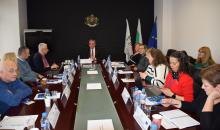The President of the National Statistical Institute Assoc. Prof. Atanas Atanasov, PhD welcomed experts from the statistical institutes of Türkiye, Bosnia and Herzegovina, Kosovo and Albania on a three-day study visit in Sofia. The visit is organized under the IPA 2019 Multi-beneficiary statistical cooperation programme which aims to prepare the statistical authorities of the Western Balkan countries and Türkiye for future EU membership. The project is funded by Eurostat and is implemented in consortium with the German consultancy company GOPA Worldwide Consultants GmbH.
"The NSI participates actively in the IPA Instrument for Pre-accession Assistance because these study visits are a good opportunity not only to help EU candidate members to bring their practices in line with the achievements of the European Statistical System, but also are an effective instrument for developing bilateral and regional cooperation", said the President of NSI Assoc. Prof. Atanas Atanasov, PhD in his welcoming speech to the participants. "Because we believe that quality is a key element in the production of statistical information and is a guarantee of the reliability of the information, the NSI is certified in compliance with the requirements of the quality management standard ISO 9001:2015 and the information security standard ISO 27001:2018, and have also implemented an Integrated Management System compliant with both standards," Assoc. Prof. Atanasov stressed.
Lecturers from NSI during the two-day study visit are Galya Stateva, PhD, State Expert in “Planning and Quality of Statistical Surveys” Department and Kostadin Georgiev, Chief Expert in “Information Systems and Applied Software” Department. The training’s agenda includes a wide range of topics dedicated to NSI's experience with the implementation of ISO 9001:2015, the improvement of existing quality management systems, internal and external audit procedures, etc. The National Statistical Institute actively participates in projects providing trainings for experts from the Western Balkans because such initiatives are a good opportunity and help to improve the quality and increase the trust in official statistics.



